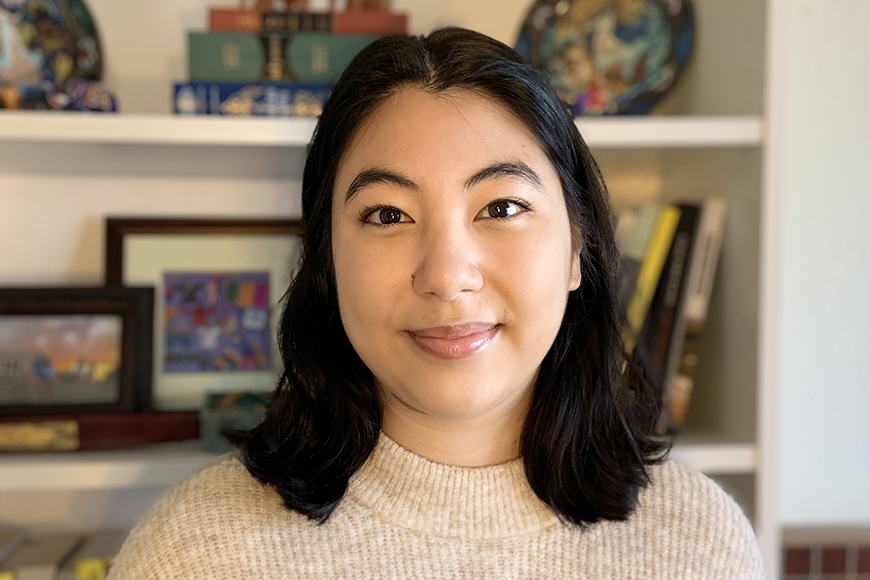PhD Candidate Wins Graduate School Teaching Award
Congratulations to Nyla Numan, a doctoral candidate in English literature who was honored with the Graduate School’s Excellence in Teaching Award, receiving an honorarium and nomination to the annual Midwestern Association of Graduate Schools (MAGS) Excellence in Teaching Award competition. Guiding students through “the development of an attentive and iterative reading practice that they can carry beyond the scope of my course and into their daily lives” is a key aim, says Numan. “I prompt students to interrogate dominant narratives and engage with a relational understanding of social categories of difference.”
Numan’s own scholarship last summer received Department of English Graduate Research Partnership Program support, and in 2022 an English Early Career PhD Merit Award. Numan graciously answered our questions via email.
What do you enjoy most about teaching? How would you describe your teaching approach and practice?
Some of my most enjoyable moments come from witnessing students assess their own growth, sharing with me how they’ve identified an assumption they held before and how something we read or discussed reframed their thinking. I appreciate these reflections, not only for students’ willingness to be vulnerable with myself and their classmates, but also for how empowered students feel in recognizing the active role they can play in the expansion of their ideas.
My teaching practice is geared towards promoting open, collaborative learning environments where such student-initiated moments can happen, encouraging “productive discomfort” (to use the language of Amy Lee in Teaching Interculturally) in discussion-based courses. I design my courses to emphasize learning and writing as a process, communicating to students how I envision each component working together: weekly reading responses and class discussions as recurring practice in lower-stakes, smaller-scale analyses that help build the skills asked of them for their final project, which I also break into steps that allow for their interests to shift and evolve over the semester.
Who have been models for you in terms of teaching?
My dissertation committee members have all inspired my pedagogy. My experiences in Professor Josephine Lee’s classroom, both as a student in her graduate course and when sitting in on some of her undergraduate classes, have been pivotal in providing models of generative discussion facilitation and effective instructor feedback. Professors Sima Shakhsari (Gender, Women & Sexuality Studies) and Megan Finch’s strategies for introducing students to theory have shaped the way that I support students in comprehending theoretical texts. Professor Rachel Trocchio’s thematic course designs have influenced the way I plan my syllabi and conceptualize my assigned readings in relation to each other. The late English Professor Qadri Ismail was also an impactful model for me in how to ask questions that lead students to discover and gradually come to new ways of thinking.
These experiences have been supplemented by opportunities to discuss and workshop my teaching materials and pedagogical approaches, such as Senior Lecturer Eric Daigre’s “Practicum in the Teaching of English” and Amy Lee and Kris Cory’s “Practicum in Writing Pedagogies.” Most recently, I’ve found exciting models in my graduate instructor cohort of Career Readiness Teaching Fellows this past fall, who were especially helpful in offering different designs for what assessment might look like and how to navigate my authority in the classroom.
What is your dissertation topic?
I am currently exploring twenty-first century Asian American historical fiction and how the function of historical re-imaginings within the genre engages with multiple meanings of “queer”: as featuring same-sex desires and gender-nonconformities, as a critical approach encompassing social relations that critique cis-heteropatriarchy and dominant structures, as an imposed gendered sexual deviance through Asian racialization, and as a world-building project that speaks to contemporary Asian American preoccupations
What are you most proud of in your research?
The exploratory process of my research, which has been continually encouraged by my advisor, Josephine Lee, against all other pressures. I am grateful to be able to allow myself, even post-preliminary exams and in my fifth year in the program, to still be surprised by the new and unexpected directions that my reading and writing take me. While many of my initial questions remain at the core of my research, my project has repeatedly shifted in scope and focus over the past year in ways that I couldn’t have anticipated but were only possible through my research process. I am excited for where my engagement with these questions will continue to lead me.
What experiences at the University of Minnesota have been most formative for you?
The coursework, especially across different fields and departments, has been so valuable, and I’ve loved learning from and with my cohort in and outside the classroom. But since I’ve finished the coursework, Professor Lee’s mentorship has been the most formative: the support and guidance of not just my dissertation, but also my pedagogy, and how I can approach the work of both as actually quite intertwined.



